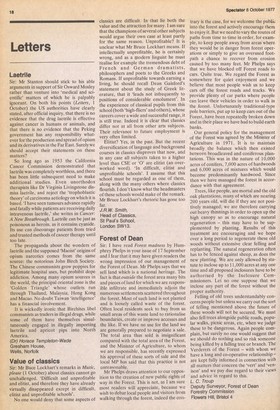Value of classics
Sir: Mr Buce Lockhart's remarks in Music, please (1 October) about classics cannot go unchallenged. 'Difficult and unprofitable and elitist, and therefore they have already virtually disappeared except in difficult, elitist and unprofitable schools'.
No one would deny that some aspects of classics are difficult. In that lie both the value and the attraction for many. I am sure that the champions of several other subjects would argue their own case at least partly for the same reason. Unprofitable? It is unclear what Mr Bruce Lockhart means. If intellectually unprofitable, he is certainly wrong, and as a modern linguist he must realise for example the tremendous debt of French and German dramatists, philosophers and poets to the Greeks and Romans. If unprofitable towards earning a living, he should recall Dean Gaisford's statement about the study of Greek literature, that it 'leads not infrequently to positions of considerable emolument'. In the experience of classical pupils from this school (both 'high-fliers' and others), whose careers cover a wide and successful range, it is still true. Indeed it is clear that classics differ not at all from other arts subjects. Their relevance to future employment is very often limited.
Elitist? Yes, in the past. But the recent diversification of language and background courses in classics disproves that now, and in any case all subjects taken to a higher level than CSE or '0' are elitist (an overworked word). 'In difficult, elitist and unprofitable schools'. I assume that this school must be regarded as one of them, along with the many others where classics flourish. I don't know what the headmasters of these schools would make of the remark. Mr Bruce Lockhart's rhetoric has gone too far.
J.R.W. Smith, Head of Classics, St Paul's School, London SW13.


































 Previous page
Previous page